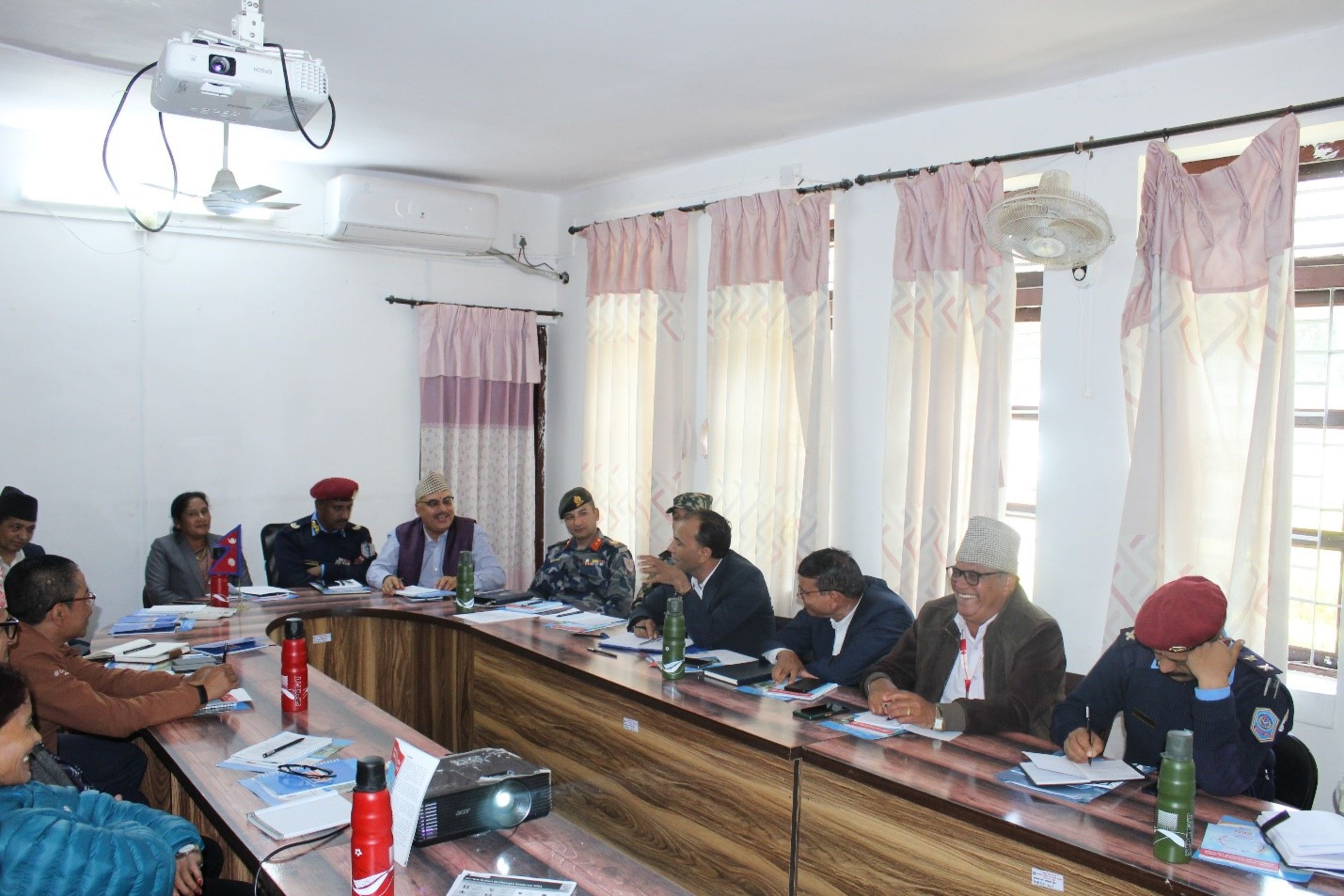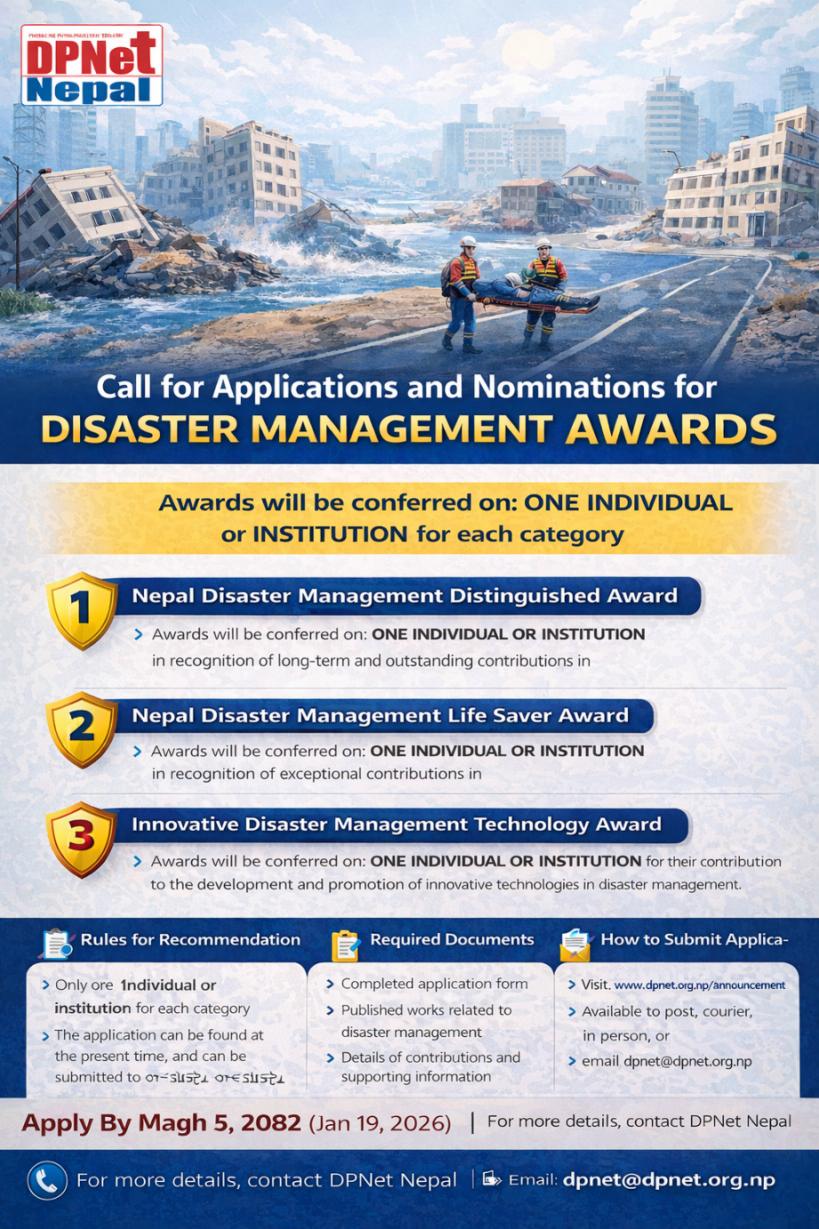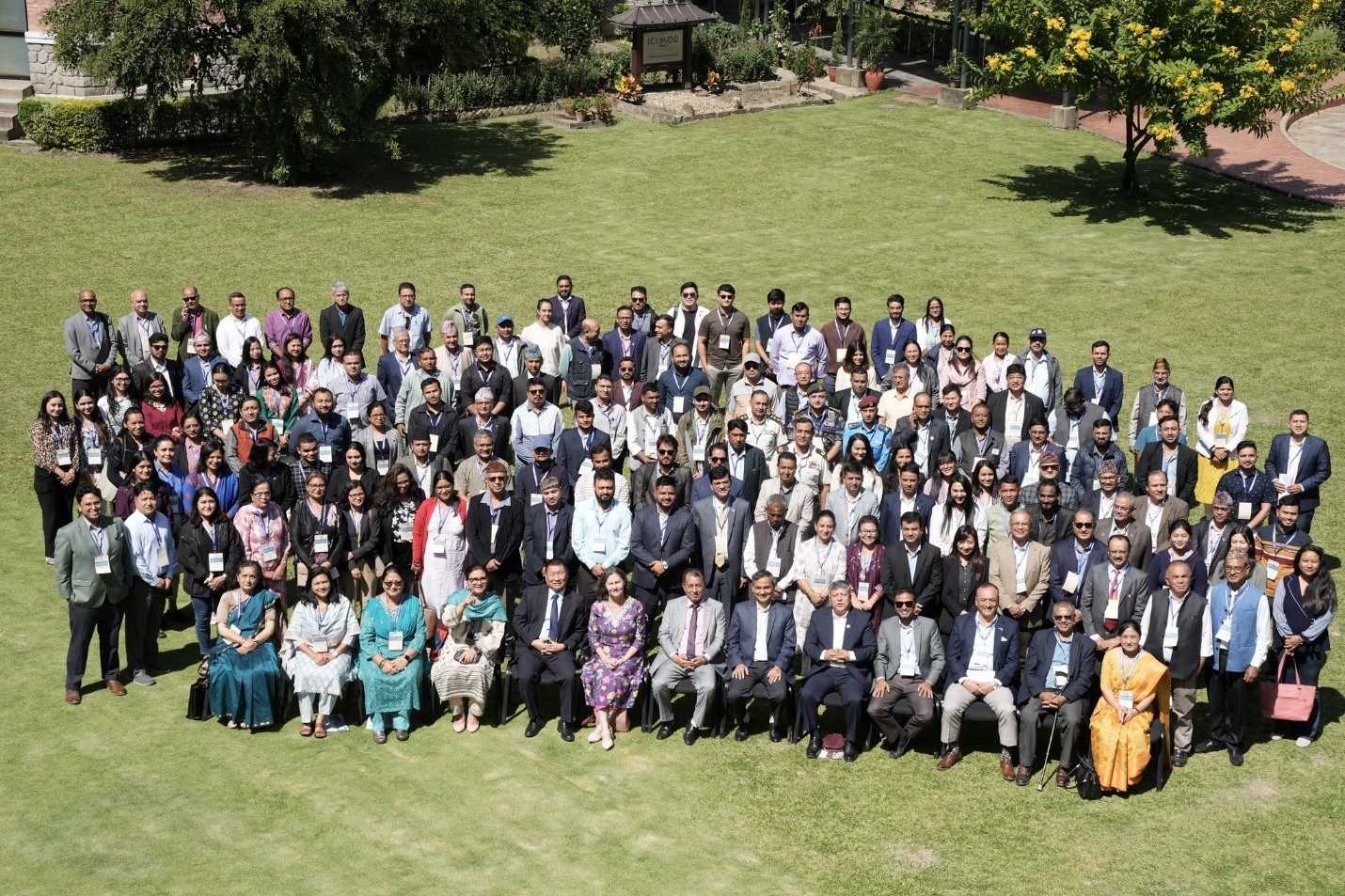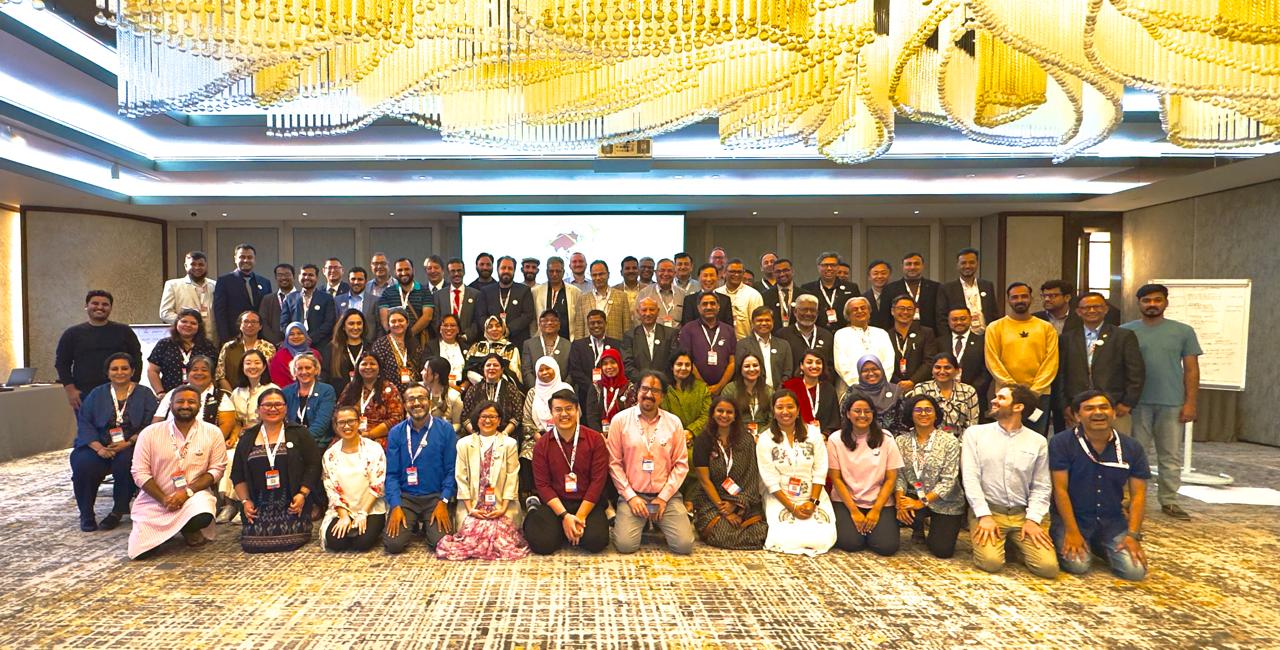Interaction Program on Provincial Disaster Risk Reduction at Karnali Province

On November 29, 2023, the Ministry of Internal Affairs and Law, Karnali Province (MoIAL), led an event titled 'Interaction Program on Provincial Disaster Risk Reduction.' The event, organized by DPNet-Nepal and financially and technically supported by USAID’s Tayar Nepal, aimed to enhance Disaster Risk Governance in Karnali Province, Nepal. The primary focus of the interaction was to evaluate the effectiveness and efficiency of acts, policies, and follow-ups related to DRR at the provincial level. Mr. Surya Bahadur Thapa, Chair of DPNet Nepal, chaired the event, with Hon. Kalyani Khadka, Chair of Provincial Affairs Committee, Provincial Assembly, Karnali Province, serving as the Chief Guest, and Mr. Nidhiraj Neupane, Acting Secretary of MoIAL as the special guest. The province secretaries from different ministries of Karnali Province, and representatives from the Nepal Army, Nepal Police, Armed Police Force, Nepal Red Cross Society, and NGOs working in Karnali Province were among the guests present at the event.
Mr. Kshitiz Paudel, Program Coordinator of DPNet Nepal started the program with a warm welcome to all distinguished guests and the attendees of the program.
Mr. Kedar Neupane, Former Secretary of the Government of Nepal and Advisor of DPNet Nepal, explained the objectives of the program and welcomed the distinguished guests and participants. He appreciated the prompt action taken by security personnel and emphasized the essential role of Disaster Risk Reduction (DRR) volunteers, including the involvement of former security personnel and local residents regarding the recent Jajarkot Earthquake in Karnali Province. He highlights the importance of mobilizing and enhancing the capacity of first responders. Mr. Neupane has suggested that the chief guest take a lead role in sensitizing members of the provincial parliament and in capacity building for local government and communities to minimize the impact of disasters. Considering our past experiences with earthquakes, COVID, and the Jajarkot diarrhea, he stresses the need for unity in efforts of among the three tiers of government and nongovernmental sector in preparedness alongside rescue efforts and emphasized that despite the presence of policies, governance has not shown significant improvement, underscoring the weak implementation of these policies. Mr. Neupane highlighted the integration of development and DRR, emphasizing the efficient utilization of existing resources, the adoption of enhanced technology, and capacity building for technocrats. He underscored the significance of mock drills and preventive measures such as fire extinguishers, hydrants, and fire engines. Furthermore, he recommended that local governments rigorously enforce building bylaws and codes to mitigate the impact of disasters. Mr. Neupane stressed the establishment of a multi-stakeholder Provincial Platform for Disaster Risk Reduction (PPDRR) in Karnali Province to facilitate effective collaboration and coordination in DRR initiatives.
Mr. Surya Bahadur Thapa, Chair of DPNet, began his presentation with an overview of DPNet Nepal's history, which was established in 1996 A.D. He described DPNet as an umbrella organization comprising members from I/NGOs, UN agencies, all working in the field of DRR. DPNet also serves as the secretariat office for the National Platform for DRR. As a networking organization, DPNet organizes various International, National, and Regional Conferences in the field of DRR. During his presentation, Mr. Thapa outlined DPNet's operational focus areas, emphasizing key pillars such as policy advocacy, knowledge management, capacity building, and coordination and networking. He shared insights into various publications released by DPNet Nepal and presented a graphical representation of integrated disaster incidents from 2070 to 2079 B.S. and highlighted the major five disaster events in the year 2079 B.S., categorized based on the number of incidents as fire, landslide, animal attack, thunderbolt, and forest fire. Mr. Thapa provided a detailed list of policy provisions relevant to disaster management, including legislative documents such as the Constitution of Nepal, the Disaster Risk Reduction and Management Act of 2074, the Disaster Risk Reduction and Management Regulation of 2076, and the Local Government Operation Act of 2074. Other significant policies mentioned encompassed the Urban Planning & Development Act, Building Code for Nepal, Sustainable Development Goals (2015-2030), and the Environment Conservation Act of 2076. Mr. Thapa focused on defining provincial roles based on the type of disaster, collaborative training between security forces and citizens, cooperation between the government and private sectors in data management and resource utilization, and the mobilization of local resources and knowledge. Mr. Thapa also outlined the historical context of the National Platform for Disaster Risk Reduction (NPDRR) formation in Nepal, dating back to 2069 B.S., guided by UN directives. He highlighted the collaborative role of NPDRR at the national, regional, and international levels and advocated for the establishment of PPDRR in Karnali Province.
Mr. Krishna Bahadur Rokaya, Disaster Focal Person of MoIAL, provided an overview of the province's historical disaster situations, including floods, landslides, fires, and earthquakes, with a special focus on MoIAL's actions during the recent Jajarkot Earthquake. He detailed that MoIAL has allocated two crores forty-five lakh for various districts affected by the earthquake, contributing to rescue and relief operations for affected communities. Mr. Rokaya explained that the provincial emergency operation center is closely collaborating with national and district-level centers, ensuring local emergency centers work with proper coordination. He underscored the importance of the Group Accident Insurance Program Operating Procedure against Disaster Risk, 2079, which offers collective disaster accident insurance coverage for human losses from disasters. He mentioned that the ministry is currently working on insuring infrastructure within the province. He also mentioned the ministry's involvement in constructing warehouses and raising awareness about disaster risk reduction through informative programs conducted at the grassroots level and in local schools.
Mr. Hira Singh Thapa, Province Coordinator of DPNet Karnali, emphasized the need for a clear and comprehensive explanation of the one-door policy among concerned stakeholders. He drew attention to the increase in incidents of rape and trafficking immediately following the Jajarkot Earthquake event, seeking attention and intervention from the police. Additionally, he called for focused efforts on capacity building and the development of a well-thought-out plan for reconstruction.
Mr. Pradipta Poudel, Acting Chair of Nepal Red Cross Society, Karnali, shared insights into the efforts undertaken by the Red Cross following the Jajarkot Earthquake. He emphasized the potential trauma caused by constant discussions about future earthquakes by experts and the media. Mr. Poudel advocated for the consideration of managing unattended settlements by concerned stakeholders.
Ms. Bishnu Devi Rawal from the NGO Federation, Karnali, highlighted the crucial need for effective collaboration between the government and the non-government sector. She pointed out that the efforts of the non-government sector are often overlooked due to the negligence of government authorities. Ms. Rawal stressed that the non-government sector is actively reaching the grassroots level to serve the people and requires proper support from the government.
Mr. Bhim Prasad Dhakal, Province Chief/DIG of Nepal Police, emphasized a significant number of casualties in the province resulting from falling off cliffs and called for attention to this matter. He highlighted the importance of regular maintenance of hilly roads to reduce the occurrence of road accidents. Despite the limited resources, he assured efficient police operations based on necessity. Mr. Dhakal shared a proactive measure undertaken by Karnali police, where they affixed stickers with the police phone number on the front doors of 2,40,425 households out of 3,71,125 in Karnali Province. This initiative has notably increased the reporting of crimes and was implemented at zero expense. He suggested expanding this approach to other provinces. In addition, Mr. Dhakal recommended linking volunteers mobilized during disasters with the police for better coordination and support which would enhance overall disaster response efforts.
Mr. Narayan Pandey, Assistant CDO of Surkhet, shared his experiences during the recent Bajhang Earthquake. He emphasized the first 72 hours as a critical timeframe and discussed how collaboration with security forces and major stakeholders played a crucial role in saving lives and properties. Mr. Pandey outlined three major aspects of disaster management: communication, coordination, and control. He urged equal consideration of all 32 legally defined disaster events in Nepal during the pre-disaster stage for effective work during and after disasters. Mr. Pandey stressed the importance of reviewing events like the Bajhang and Jajarkot Earthquakes to better plan for future events and reconstruction. He emphasized the need for proper research and the implementation of building codes with the coordination of all three tiers of government to minimize the impact of disasters.
Mr. Bishnu Prasad Koirala, Province Secretary at the Office of Chief Minister and Council of Ministers in Karnali Province, provided insights into the recent Jajarkot earthquake. He praised the effective approach in the rescue operation but pointed out challenges faced by the provincial government. Although they allocated one and a half million to the district disaster fund, the funds have yet to be transferred to the intended account, highlighting administrative complications. Mr. Koirala emphasized the need for clarity in guidelines, particularly regarding the decision-making process for constructing temporary shelters. The delay from the federal government in determining responsibility is causing continued suffering for the affected community. He stressed the importance of clear criteria to facilitate efficient support and relief distribution. In addressing the reconstruction efforts, Mr. Koirala raised concerns about the rebuilding of structures with archaeological significance and the difficulty of landless individuals in Jajarkot. He urged for a careful reconstruction approach, citing observations that buildings constructed with round stones in the past were more susceptible to destruction. Furthermore, he advocated for reducing taxes on building registration, drawing lessons from past earthquakes. While Karnali Province has the capability to address various aspects of recovery, Mr. Koirala emphasized the necessity of capacity building and support from all levels of government in a coordinated manner. He underscored the importance of proper needs and damage assessment in the affected regions for effective planning and resource allocation.
Mr. Nidhiraj Neupane, a Special Guest, highlighted the provincial government's efforts in response to the Jajarkot earthquake. He explained that the MoIAL serves as the focal ministry for DRR and is efficiently working with other ministries and clusters in the province. However, he expressed the need for support from all stakeholders. Mr. Neupane pointed out that the provincial government is not assuming the responsibilities outlined in the constitution of Nepal. Using the example of the previous year, he mentioned that the federal government declared four districts of Karnali Province as a state of emergency without consulting the provincial government. Mr. Neupane emphasized that the work carried out by the three tiers of government often results in duplication due to a lack of coordination, and the federal government is not collaborating effectively with the provincial government, even in the case of the Jajarkot earthquake. He also highlighted discrepancies in the data regarding losses and damages from the Jajarkot earthquake across different tiers of government. He also gave his commitment to work on the formation of PPDRR after discussing with the secretary and minister of the province. Mr. Neupane called on agencies like DPNet to work towards maintaining intergovernmental coordination, facilitating cooperation among the three tiers of government.
Hon. Kalyani Khadka, Chief Guest emphasized the collaboration of the legislative, executive, and judiciary for the improvement of provincial affairs, including DRR. She highlighted ongoing efforts to establish proper working modalities during the implementation of federalism, emphasizing that provinces should be provided with the responsibilities as outlined in the constitution with proper budget allocation and coordination with all three tiers of government within the federal system. Agreeing with the viewpoints raised during the program, Hon. Khadka underscored the strong support of the Provincial Affairs Committee, starting from the initial rescue operations during the Jajarkot Earthquake.
Hon. Khadka stressed the urgent need for psychosocial support, addressing the psychological and mental health problems faced by the affected community. She advocated for special attention to elderly individuals, pregnant women, and lactating women in the field. Highlighting the effectiveness of the One Door policy and multi-party committee in facilitating relief actions in Jajarkot and Rukum West, she acknowledged the need for proper categorization and mobilization of volunteers based on their expertise to avoid duplication and mismanagement. Pointing out the necessity for risk mapping and resettlement of vulnerable settlements, she provided an example of scattered settlements in Rukum Athabiskot 14. Hon. Khadka emphasized the immediate need for temporary shelter and the subsequent requirement for reconstruction in the long term. She stressed the importance of proper data management, suggesting that local governments play a role in this but should be strengthened. Addressing concerns about damaged buildings under bank loans and those without legal documents, she urged the government to take action. Hon. Khadka highlighted the necessity of incorporating suggestions from the ground level into legal documents. Additionally, she underscored the immediate need for the skilled demolition of damaged buildings and the utilization of security personnel from other districts. Hon. Khadka explained the need for sensitization and training programs for members of the provincial assembly regarding DRR. Lastly, she emphasized the strengthening of the government, with support from the non-governmental sector in a collaborative approach.
Mr. Surya Bdr Thapa, the Chair, in his closing remarks, emphasized the need for proper coordination and collaboration, stating that DPNet is prepared to facilitate these efforts as the umbrella organization and member secretariat of NPDRR. He highlighted that the observed gaps at this level would be advocated at the federal level. Mr. Thapa mentioned that suggestions regarding DRR are being provided to the Prime Minister, and recommendations from this program will be included in those suggestions. He pointed out that the NGO sector possesses knowledge and experience and is ready to work in coordination with the government on DRR. Mr. Thapa explained that a multi-stakeholder platform like PPDRR would be contributory in this collaboration. He commended the insurance scheme provided by the province, expressed gratitude to all participants for their presence, and officially concluded the program.











